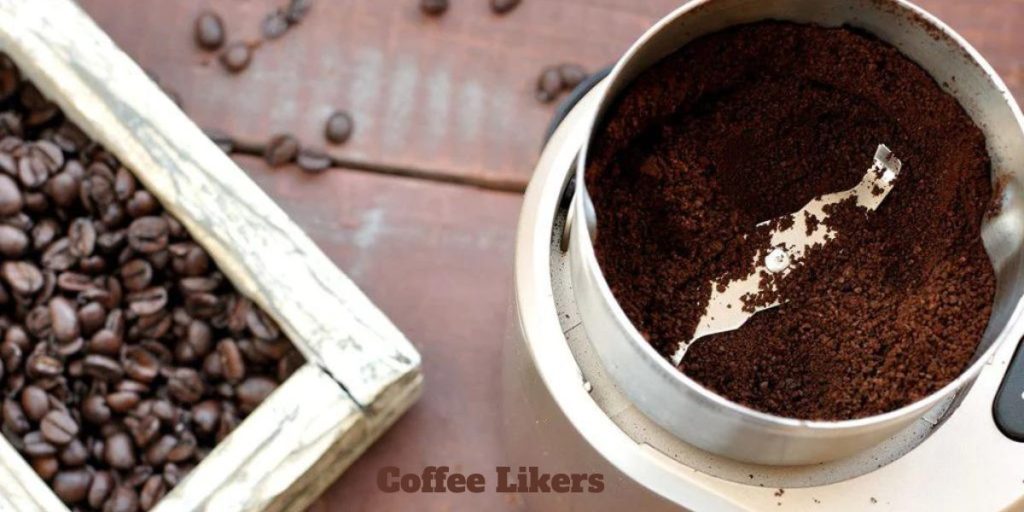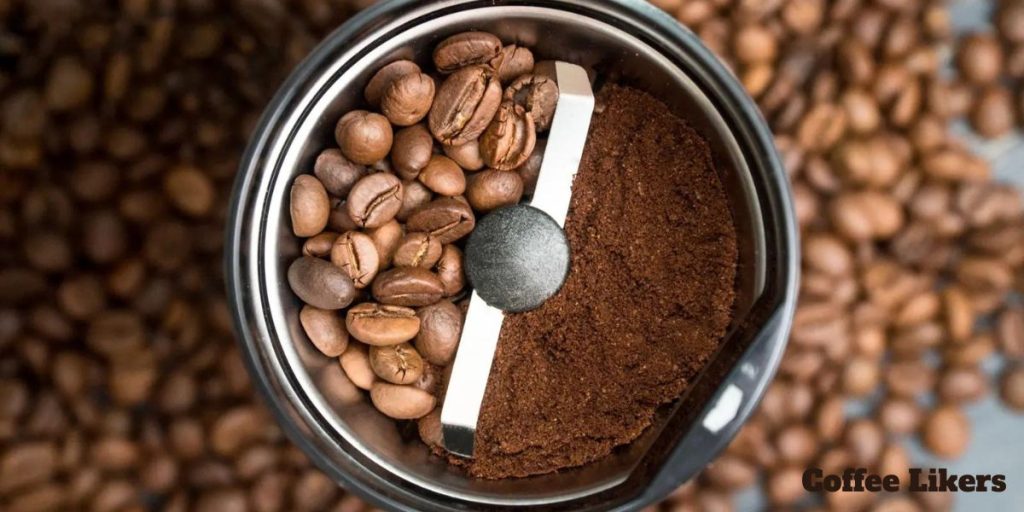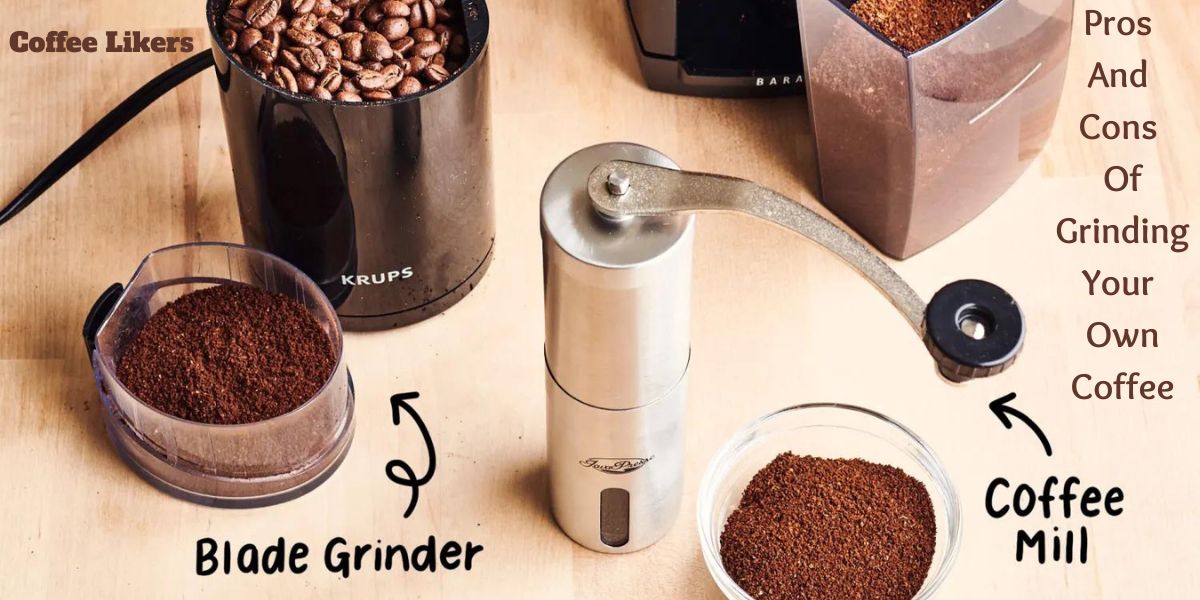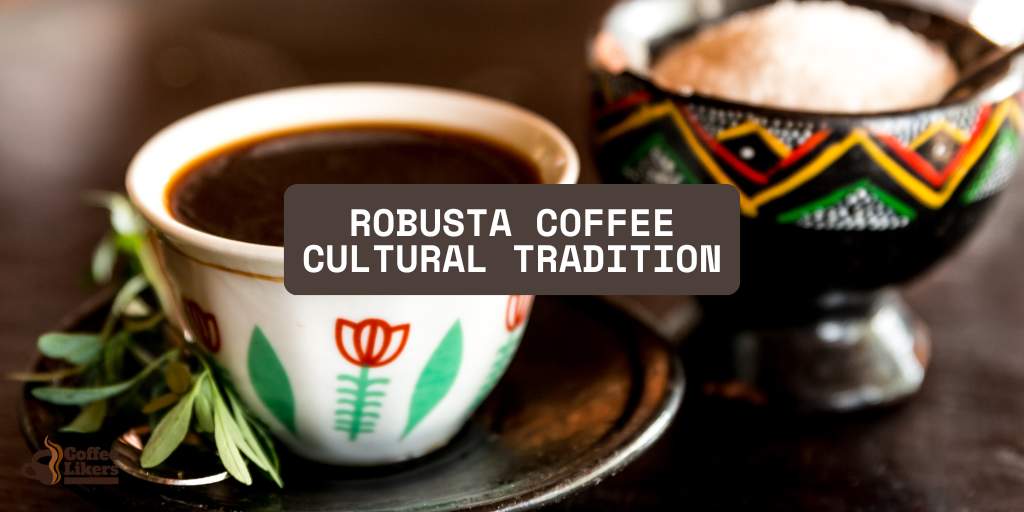Are you tired of drinking bland, pre-ground coffee? Grinding your own coffee beans can take your morning cup of joe to a whole new level. But is it worth the extra effort?
In this blog post, we’ll explore the pros and cons of grinding your own coffee. From fresher flavor to increased control over grind size, there are plenty of benefits to consider.
However, there are also some downsides to be aware of, such as the additional time and equipment needed. So grab a seat and let’s dive into the world of DIY coffee grinding!
What are the pros and cons of grinding your own coffee? Grinding your own coffee has benefits like fresher, customizable flavors, but it can be time-consuming and require an initial investment in equipment. It also demands some skill and creates a bit of a mess. So, it’s a trade-off between quality and convenience.
Pros And Cons Of Grinding Your Own Coffee: Brief Overview
Grinding your own coffee beans can offer a number of advantages, as well as some potential drawbacks. On the positive side, grinding your own coffee allows you to have complete control over the grind size, which can impact the flavor and strength of your brew.
Freshly ground coffee also tends to have a more vibrant aroma and taste compared to pre-ground coffee. Grinding your own coffee can be a fun and satisfying process for those who enjoy being involved in every step of their brewing routine.
There are also some downsides to consider. Grinding your own coffee requires investing in a grinder, which can be an additional expense. It also takes time and effort to grind the beans before each use, which may not be ideal for those who are always on the go or prefer a quick and convenient brewing method.
Improper grinding techniques or inconsistent grind sizes can result in an uneven extraction and potentially affect the overall quality of your coffee.
Ultimately, whether grinding your own coffee is worth it depends on your personal preferences and priorities. If you value freshness, control over flavor profiles, and enjoy the process of brewing from scratch, then grinding your own coffee may be a worthwhile endeavor.
However, if convenience and speed are more important to you, sticking with pre-ground coffee may be a more practical choice.
Pros Of Grinding Your Own Coffee Beans
There are several pros to grinding your own coffee.
Firstly, freshly ground coffee beans yield a more flavorful and aromatic cup of coffee. When you grind the beans just before brewing, you preserve the natural oils and flavors that can be lost in pre-ground coffee.
Secondly, grinding your own coffee allows for greater control over the grind size, which is important for different brewing methods. For example, a coarser grind is ideal for French press while a finer grind is needed for espresso.
Finally, grinding your own coffee gives you the opportunity to experiment with different bean varieties and origins, allowing you to discover new and unique flavors.
Fresher Flavor And Aroma
Grinding your own coffee beans ensures a fresher, richer flavor and aroma in your cup. When you grind coffee just before brewing, the essential oils and flavors remain intact, delivering a more vibrant and aromatic experience.
Unlike pre-ground coffee which can lose its freshness over time, freshly ground beans give your morning brew that burst of flavor that you’ll love.
Explanation Of How Grinding Preserves Flavors And Aromas
When you grind coffee beans just before brewing, magic happens. The process helps preserve flavors and aromas locked inside the beans. Grinding opens up the beans, releasing their natural oils and compounds, which hold the essence of the coffee.
These oils are essential for flavor and aroma, and when they’re freshly released, you get a cup of coffee that’s bursting with taste and fragrance, elevating your coffee experience.
Comparison With Pre-Ground Coffee’s Flavor Degradation
Have you ever noticed how pre-ground coffee loses its spark? When coffee is ground ahead of time, it’s exposed to air, causing it to lose flavor and aroma. The essential oils and compounds break down, leading to a duller taste.
In contrast, grinding fresh coffee before brewing locks in those flavors, giving you a vibrant and flavorful cup, a league above the stale taste of pre-ground options.
Customizable Grind Size
Choosing your grind size is a game-changer. Grinding your coffee lets you customize the grind size to match your brewing method. For French press, you can go coarse; for espresso, it’s fine.
This control over grind size influences the taste and extraction, ensuring you get that perfect cup of coffee, tailored to your preferences. Say hello to a personalized coffee experience with every brew.
Ability To Adjust Grind Size For Various Brewing Methods
One of the perks of grinding your own coffee is the flexibility to adjust the grind size according to your brewing method. Different methods, like drip, espresso, or French press, require distinct grind sizes for optimal flavor extraction.
Having this control ensures that your coffee grounds are just right for the brewing method you love, delivering the perfect cup of coffee every time you brew.
Enhanced Control Over Extraction And Taste
Grinding your coffee gives you the power to fine-tune your brew. The grind size affects how your coffee extracts during brewing. Finer grind for a longer extraction, coarser for a shorter one.
This control directly impacts the taste, allowing you to dial in the flavor to match your preference. It’s like being the conductor of your coffee orchestra, creating a symphony of taste just the way you like it.
Retention Of Nutritional Value
Grinding your coffee just before brewing isn’t just about taste; it’s about nutrition too. Freshly ground coffee retains more of its nutritional value compared to pre-ground coffee.
The natural oils and nutrients present in the coffee beans are preserved, ensuring that your cup of joe is packed with the goodness that coffee beans naturally offer. It’s a small step towards a more wholesome coffee experience, one cup at a time.
How Grinding Right Before Brewing Preserves The Coffee’s Nutrients
Ever wondered about the magic of grinding just before brewing? It’s not just about flavor, but also about nutrition. Grinding coffee right before brewing preserves vital nutrients.
When coffee is freshly ground, essential oils and nutrients within the beans are conserved, ensuring that your cup of coffee delivers not only in taste but also in nutritional value. It’s a simple step for a healthier, more satisfying coffee indulgence.
Better Brewing Experience
Grinding your own coffee beans amplifies the joy of brewing. There’s something truly satisfying about the process—measuring the beans, the invigorating aroma as you grind, and the anticipation of a perfect cup.
The act of grinding and the resulting freshness make each sip rewarding. It’s a hands-on experience, allowing you to craft your coffee just the way you like, enhancing the overall pleasure of your daily brew.
Enjoyment Of The Grinding Process
Grinding your own coffee beans is surprisingly delightful. The process itself is engaging and therapeutic—the whirring of the grinder and the aromatic wafts from freshly ground beans.
It connects you to the heart of your coffee, making that cup even more rewarding. The joy of hands-on preparation adds a little something extra to your daily coffee routine, making each brew more satisfying.
The Satisfaction Of A Customized Coffee Experience
Crafting your coffee experience is uniquely satisfying. When you grind your coffee, you’re in control, tailoring the grind size to suit your taste and brewing method.
It’s like personalizing a piece of art, ensuring that each cup resonates with your preferences. The result? A delightful, customized coffee that perfectly matches your cravings, elevating your daily coffee ritual to a new level of satisfaction.

Cons Of Grinding Your Own Coffee Beans
While there are certainly benefits to grinding your own coffee, there are also some drawbacks to consider. One of the main cons is the time and effort required.
Grinding coffee beans can be a time-consuming process, especially if you have a manual grinder. Grinding your own coffee requires an investment in a good quality grinder, which can be quite expensive.
Another potential downside is that freshly ground coffee can lose its flavor and aroma more quickly than pre-ground coffee. This means that if you don’t consume your coffee quickly enough, it may begin to taste stale.
Grinding your own coffee can create a mess in your kitchen, with coffee grounds getting stuck in the grinder and spilling onto the countertop.
Overall, while there are benefits to grinding your own coffee, it’s important to weigh these cons before deciding if it’s the right choice for you.
Time-Consuming
Grinding your own coffee can be time-consuming, especially if you’re in a hurry. It takes a few minutes for one cup and longer for more. Cleaning the grinder also adds time.
However, for coffee lovers who value freshness and flavor control, it’s worth it. Grinding your own beans means fresher, better-tasting coffee, even though it takes more time.
Elaboration On The Extra Time Needed For Grinding Before Each Brew
Grinding your coffee does take a tad more time, but the payoff is worth it. It’s an additional step in your coffee routine that requires a few minutes.
However, considering the fresher and more flavorful cup you’ll get, the extra effort in grinding before each brew becomes a small investment for a significantly better coffee experience. A little time spent grinding translates to a lot of satisfaction in every sip.
Equipment And Cost
Grinding coffee offers benefits but has downsides too. It demands an initial grinder investment, with quality models being pricey. Grinding takes time, especially for different grind sizes.
Yet, it preserves freshness and flavor better. Pre-ground coffee loses aroma quickly, while fresh grinding lets you adjust the grind size for your taste. It’s a choice based on your priorities and commitment to equipment and time.
Discussion On The Expense And Space Requirements For A Grinder
Considering a grinder? Let’s talk about cost and space. Yes, a good grinder is an investment. There’s an initial expense and it takes up some kitchen real estate. But weigh it against the quality of your coffee.
The richness and control over grind size you gain make it a reasonable trade-off. Ultimately, the joy of a great cup often outweighs the cost and space considerations.
Comparison With The Cost Of Pre-Ground Coffee
Comparing costs? Grinding your coffee at home might seem pricier initially, given the grinder purchase. Yet, break it down per cup, and it’s often more affordable than constantly buying pre-ground.
Moreover, the enhanced taste and freshness you gain are invaluable. So, while upfront costs may vary, the investment in taste and overall satisfaction tips the scale in favor of grinding your own.
Potential Inconsistency
Grinding coffee at home can be inconsistent, affecting flavor and brewing. Adjusting grind sizes for various methods is time-consuming. Yet, it offers freshness and flavor control. Experimentation is possible. Deciding to grind your own coffee depends on personal preferences and priorities.
Difficulty In Achieving A Consistent Grind Size
Grinding your coffee brings great flavor, but consistency is the challenge. It’s not always easy to achieve the exact grind size needed. Factors like grinder type, bean variation, and technique can affect consistency.
But fear not. With a bit of practice and understanding your grinder, you can minimize variations and find the sweet spot for your desired brew. It’s a small hurdle for a big flavor reward.
Impact On The Taste And Quality Of Coffee
The grind impacts your coffee immensely. A fine or coarse grind alters extraction, affecting taste. Too fine may make coffee bitter, too coarse might leave it weak.
Consistency matters too; uneven grinds result in an inconsistent taste. Finding the right grind for your preferred brewing method is key. It’s the fine balance that elevates your coffee from ordinary to exceptional.

Factors To Consider When Deciding To Grind Coffee Beans
There are several factors to consider when deciding whether to grind your own coffee. One of the main advantages of grinding your own coffee is the ability to have freshly ground coffee beans, which can enhance the flavor and aroma of your cup of joe.
We have to consider the pros and cons of grinding your own coffee, coffee grinding allows for more control over the grind size, which can impact the taste and brewing process.
However, there are also some drawbacks to consider. Grinding your own coffee can be time-consuming and require additional equipment, such as a grinder.
It also requires knowledge and expertise to achieve the desired grind consistency. Furthermore, once coffee beans are ground, they begin to lose their freshness and flavor more quickly.
Therefore, if you choose to grind your own coffee, it is important to only grind what you need for immediate use to ensure optimal taste. Ultimately, the decision to grind your own coffee depends on personal preferences and priorities in terms of convenience and quality.
Frequency Of Coffee Consumption
When deciding to grind your own coffee, consider how often you drink it. If you’re a daily coffee lover, freshly ground beans offer richer flavor and aroma, elevating your experience.
However, occasional drinkers or convenience seekers may prefer pre-ground coffee. Make your choice based on your habits and preferences.
How Often You Drink Coffee And Its Influence On The Decision
How much you love your coffee guides this choice. If you’re a daily coffee enthusiast, investing in a grinder makes sense. The daily ritual of grinding before brewing enhances the overall experience.
For those less frequent in coffee consumption, the convenience of pre-ground might suffice. Your coffee habits dictate the level of involvement you seek in your morning cup.
Brewing Preferences
Grinding your own coffee offers control over grind size for various brewing methods. But it’s time-consuming and needs a good grinder.
Freshly ground coffee loses flavor faster, so only grind what you need. Decide based on your flavor and convenience preferences.
Preference For Specific Brewing Methods And Their Grind Requirements
Your preferred brew style matters. Different methods demand different grind sizes. For the French press, a coarse grind works magic, but for espresso, fine is the key that comes to coffee.
If you adore variety and like experimenting with various brewing methods, having control over your grind size becomes a delightful necessity. It’s about aligning your coffee grind with the brewing technique you love, ensuring that each cup is perfect.
Budget And Space
Grinding your coffee has budget and space implications. It’s cost-effective long-term, with whole coffee beans cheaper and less waste.
But it needs extra equipment and kitchen space. Consider your budget and space availability alongside your preferences when deciding on the amount of coffee with a burr grinder or blade grinder.
Consideration Of The Financial Aspect And Available Kitchen Space
Thinking about cost and space is crucial. The best coffee grinder has a price tag and takes up space in your kitchen. It’s an investment, but it pays off in flavor. Consider your budget and available kitchen room.
If you’re tight on either, think about how much you value a great cup of coffee. Balancing your priorities ensures both your coffee and wallet are happy.
Time Commitment
Grinding coffee demands time. It’s an extra step, a few more minutes in your routine. For the busy bees, this might seem like a drawback.
But when you savor that first sip of freshly ground or drip coffee, the time spent grinding becomes a worthy investment.
It’s a trade-off between convenience and the exquisite taste that comes with a little dedication to roasted coffee. Your choice depends on your coffee-time balance.
Assessing The Time Available For Grinding And Brewing Coffee
Consider your daily clock. If time is on your side, grinding your coffee is a delightful choice. It adds a few minutes to your brewing routine, but the taste rewards are significant.
If your schedule is tight, pre-ground might fit better. It’s about matching your coffee-making process with the time you can spare, ensuring that each cup fits seamlessly into your daily rhythm.
FAQ About Pros And Cons Of Grinding Your Own Coffee
Is It Worth It To Grind Your Own Coffee?
Grinding your own coffee can be worthwhile for better flavor and aroma, but it depends on your preferences and time. If you enjoy fresher coffee and don’t mind the extra effort, it’s worth it. Otherwise, pre-ground coffee offers convenience but may sacrifice some freshness.
Is Coffee Stronger If You Grind It Yourself?
Yes, coffee can be stronger when you grind it yourself because freshly ground beans preserve more flavor and aroma. You can control the grind size to extract more strength, but it also depends on factors like bean type brewing method, and type of coffee maker.
Does Grinding Your Own Coffee Beans Make Better Coffee?
Grinding your own coffee beans often makes better coffee. It preserves freshness and allows you to control the grind size, enhancing flavor and aroma. However, the quality also depends on factors like bean quality, equipment, brewing method, and types of coffee makers.
Is It Cheaper To Buy Coffee Beans And Grind Them Yourself?
Buying the best coffee beans and grinding them yourself can be more cost-effective in the long run. While initial equipment costs may be higher, whole beans are typically less expensive per ounce than pre-ground coffee. Plus, you can use only what you need, reducing waste.
Final Thought
Grinding your own coffee is a rewarding experience for coffee lovers. It offers fresher flavor and grind control for better mornings. Experimentation with brewing methods unlocks new flavors. However, consider costs and time.
Invest in a good grinder for consistency for fresh ground coffee. Grinding the coffee is worthwhile if you’re passionate and committed to improving your coffee experience. There are some important and potential pros and cons of grinding your own coffee we have discussed.





Leave a Reply